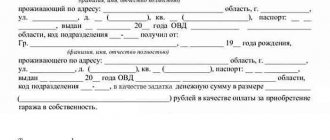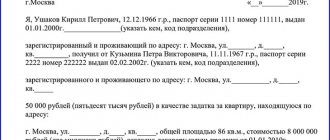Advance and deposit: the difference is significant!
The Civil Code defines the concept of only a deposit, but not an advance. The deposit is the amount that is transferred to the seller by the potential buyer towards the main payment. And this amount is actually legally considered to be security for the planned conclusion of the contract and the fulfillment by the parties of their purchase obligations.
But the advance payment, which plays an important role in the real estate market, unfortunately, does not have a legislative basis. A small amount paid by the buyer, which is part of the total cost of the apartment (usually up to 10%), performs exclusively the function of payment, being just an advance payment. It does not fulfill the function of securing the purchase inherent in the deposit.
Therefore, when the buyer does not fulfill the obligation or the preliminary agreement is terminated for any reason, the advance amount must be returned by the seller .
Is the deposit returned to the winner and loser of the auction?
Auction and competitive bidding is often accompanied by a preliminary deposit of funds as security for the intentions of the auction participant. According to Art. 448 of the Civil Code of the Russian Federation, the deposit payment is returned to the participant:
- in case of participation, but defeat in the auction;
- in case of auction cancellation.
Please note
: The refund period is 20 calendar days from the date of the auction or cancellation.
The funds contributed by the winner are taken into account as an advance payment for the subject of the auction. If the winner refuses to pay the full price, the deposit payment remains with the organizers.
Failure of the deal: what will happen to the advance and deposit?
An initial payment in the form of a deposit creates obligations for both parties entering into the agreement. The buyer , who ultimately did not buy the apartment, will not be able to return the amount paid as a deposit for it - the money will remain with the seller . If the seller, after receiving the deposit, finds a more profitable buyer, then, by law, he is obliged to return double the amount of the deposit received . In addition, the injured party is given the right to demand coverage for losses incurred due to the failure of the transaction.
If the parties have not drawn up the purchase and sale agreement for reasons beyond their control, or by mutual agreement, then the amount of the deposit, like the advance amount, must be returned.
But if the transaction prepared by the advance agreement does not take place within the agreed time frame, the buyer has the right to return the deposit under the preliminary agreement . The return of the advance amount is regulated by Articles 395 and 487 of the Civil Code. Moreover, if the seller evades the return, we can already talk about his unreasonable use of other people's funds and, accordingly, about the payment of penalties. The interest rate will be determined by the bank discount rate in effect at the time of fulfillment of the obligation.
The seller may also demand compensation for losses incurred due to violation of agreements by the buyer. This right is given to him by articles 328 and 487 of the Civil Code.
Civil Code of the Russian Federation on the return of the deposit
The return is regulated by Art. 381 of the Civil Code of the Russian Federation “Consequences of termination and failure to fulfill an obligation secured by a deposit.” According to the article, refunds are made as follows:
- if the contract is terminated due to the fault of the party who paid the deposit, then it remains with the counterparty;
- if the culprit is the party who accepted the payment, then it undertakes to return the payment in double amount;
- if the agreement is terminated by agreement of the parties or due to “force majeure”, then the amount is returned in a single amount.
How to return an advance payment for an apartment from a realtor?
Since the law does not provide the seller with grounds for withholding the advance amount, cases for its return are considered in court. Sellers, represented by realtors, try to defend their interests in two ways:
- They defend in court the recognition of the advance as a deposit. And the deposit, according to the law, is not returned to the buyer who refuses to purchase the apartment.
- Initially, they stipulate in the advance agreement the possibility of transferring the advance amount into their own property if the purchase and sale transaction is disrupted by the buyer.
Judges do not take such arguments seriously. Moreover, the inclusion in the advance agreement of provisions on the responsibility of the parties, similar to the provisions of the deposit agreement, is contrary to legislative norms (Articles 421 and 422 of the Civil Code).
Summarize. If the matter does not reach the signing of the main agreement, then the obligations of the parties under the advance agreement are terminated, and the advance amount paid, in accordance with Article 1102 of the Civil Code, is returned to the plaintiff buyer - regardless of who is to blame for the failure of the transaction.
Deadlines
The time frame within which the parties must conclude the main agreement is determined by them independently. They are indicated in the preliminary agreement. If the prescribed deadlines expire and the agreement is not concluded, then one of the parties must send the other a requirement to sign the agreement.
When the second party evades such a requirement, legal consequences apply to the deposit: it either remains with the seller or is returned in double amount to the buyer.
If specific deadlines for concluding the main agreement are not specified, then the preliminary agreement is considered to be valid for a year.
Certificate of temporary disability of an employee - find out how to get it. Proper payroll calculation is very important. Find out about the important nuances of this process in our professional article.
If you were sent on a business trip over the weekend, then you need our material!
How to return the deposit under a preliminary agreement?
If the seller does not even want to hear about the return of the deposit pre-trial, then the failed buyer will have to defend his rights in court. Judicial practice includes two approaches to considering such cases .
- The judge may recognize the deposit agreement as void. As a result, the amount contributed by the buyer will be equated to unjust enrichment of the seller (as in the case of an advance payment) and will be subject to return.
- The judge may recognize the deposit agreement as legal, that is, ensuring future obligations under the planned sale and purchase agreement. Then, according to the rules on deposits, the buyer will not be able to return the money.
Which approach will the court choose? Solving the question “Is it possible to return the deposit under a preliminary agreement? " will depend on a number of circumstances. The judge will literally take into account everything: from the conditions for signing the preliminary agreement to compliance with its deadlines. The buyer should know that the probability of winning is estimated at 50/50. Therefore, it is so important to pay maximum attention to studying the preliminary agreement proposed for signing.
Actions in case of refusal to return the deposit
If the opposite party refuses to return the deposit, the participant who contributed the funds has the right to demand their return exclusively in court. Contacting the police or other authorities will most likely not bring the desired result. Cases regarding financial disputes between private individuals are heard by courts of general jurisdiction. You can file a claim only after the expiration of the date specified in the agreement or receipt.
For your information
After filing a lawsuit, the court will review the case and make a ruling. If the judge determines that the failure of the agreement was due to the fault of the person who received the preliminary payment or due to force majeure obstacles, then most likely a decision will be made to return the money. If the court determines that the transaction was disrupted due to the fault of the participant who transferred the funds, then the deposit will remain with the opposite party.
Practical examples of debt repayment with collateral
Situation 1: Out-of-court procedure for repaying an obligation
The company received a loan secured by goods in circulation. The outstanding amount of debt (including interest) is 354,000 rubles. The collateral value of the goods is determined according to the collateral agreement in the amount of 590,000 rubles. The book value of the remaining goods in the warehouse is RUB 750,000. An agreement was concluded between the parties on an out-of-court procedure for foreclosure of the collateral. At the same time, the parties agreed that part of the pledged property would be sold to the creditor at a price of RUB 354,000. (including VAT - 54,000 rubles). The balance of goods worth RUB 236,000. (590,000 rubles - 354,000 rubles) is released from collateral and placed at the disposal of the borrower.
The company uses the accrual method.
Solution. The accountant made the following entries:
Dt 62 Kt 90-1,354,000 rub. – income from the sale of goods (collateral) is reflected;
Dt 90-3 Kt 68-VAT 54,000 rub. – VAT is charged on the sale of the pledged item;
Dt 90-3 Kt 41,300,000 rub. – the cost of goods sold is recognized;
Kt 009 590 000 rub. – the value of the pledged property is written off;
Dt 66 Kt 62,354,000 rub. – the debt on borrowed obligations has been repaid.
The accountant included the proceeds from the sale of the pledged property as income tax income (Article 249 of the Tax Code of the Russian Federation). Since the company uses the accrual method, income from sales is recognized on the date of transfer of ownership of this property to its buyer (clause 3 of Article 271 of the Tax Code of the Russian Federation). The accountant reduced the amount of recognized revenue by the cost of the pledged property and the amount of expenses associated with its sale (clause 1 of Article 268, Articles 318, 319 of the Tax Code of the Russian Federation).
Situation 2: Sale of collateral at auction
The company received a loan secured by goods in circulation. The outstanding amount of debt (including interest) is 354,000 rubles. The collateral value of the goods is determined according to the collateral agreement in the amount of 590,000 rubles. Since the company cannot repay the debt, the pledged goods are sold at auction. Sales proceeds amounted to RUB 590,000. (including VAT - 90,000 rubles).
The accountant made the following entries:
Dt 76 Kt 90-1,590,000 rub. – income from the sale of the pledged item is reflected;
Dt 90-3 Kt 68-VAT 90,000 rub. – VAT is charged on the sale of the pledged item;
Dt 90-3 Kt 41,500,000 rub. – the cost of goods sold is taken into account;
Kt 009 – 590,000 rub. – the value of the pledged property is written off;
Dt 66 Kt 76,354,000 rub. – the debt on borrowed obligations has been repaid;
Dt 51 Kt 76,236,000 rub. (590,000 rubles - 354,000 rubles) - funds received from the sale of the pledged item and exceeding the amount of the repaid loan obligation.
Taxation
Regardless of whether the pledged property is sold at auction or sold directly to the creditor, the mortgagor has the obligation to calculate income tax and VAT.
Income tax. Since the owner of the pledged property is the pledgor, it is he who reflects in the accounting the income and expenses associated with the sale of the pledged property (Article 249, paragraph 1 of Article 268 of the Tax Code of the Russian Federation).
In addition to the cost of acquiring the collateral (residual value), other costs can also be included in the expenses. For example, the amount of reimbursement of the mortgagee’s costs for the sale of the pledged property (subclause 31, clause 1, article 264 of the Tax Code of the Russian Federation). Also, when calculating income tax, you can take into account the costs of assessing and insuring the pledged item (subclause 1, clause 1, article 343 of the Civil Code of the Russian Federation, clause 1, article 252 of the Tax Code of the Russian Federation). This is the opinion of officials (letter of the Ministry of Finance of Russia dated February 15, 2008 No. 03-03-06/1/103).
VAT. The transfer of property as collateral does not entail any VAT consequences, since the ownership right remains with the pledgor regardless of whether the pledged property is actually transferred to the pledgee or not (Clause 2 of Article 335 of the Civil Code of the Russian Federation). Thus, when transferring the subject of pledge, no sale occurs, and the object of VAT taxation does not arise (clause 1 of Article 39, subclause 1 of clause 1 of Article 146 of the Tax Code of the Russian Federation).
The sale of collateral property, on the contrary, is subject to VAT (subclause 1, clause 1, article 146, clause 2, article 154 of the Tax Code of the Russian Federation). Of course, this does not apply to tax-exempt property. Naturally, in such a situation the mortgagor should not charge VAT.
Single tax under the simplified tax system. Proceeds from the sale of the pledged item must be included in the tax base when calculating the single tax. The pledgor must recognize it in the following order (clause 1 of article 346.15, clause 1 of article 249, clause 1 of article 346.17 of the Tax Code of the Russian Federation):
• in the amount due to the pledgee – on the day the pledgee’s claims against the pledgor are satisfied;
• in the amount returned to the pledgor - on the date of receipt of funds to the current account (cash) of the pledgor.
When reflecting income from the sale of pledged goods, expenses include the cost of acquiring these goods, as well as the amount of “input” VAT on them (subclause 8, 23 clause 1 of Article 346.16 of the Tax Code of the Russian Federation).
As for the costs of assessing and insuring the collateral, they cannot be included in the costs of the single tax.
Such expenses are not listed among the expenses included in the calculation of the tax base (clause 1 of Article 346.16 of the Tax Code of the Russian Federation, letter of the Department of Tax Administration of Russia for Moscow dated March 11, 2004 No. 21-09/16354).
It must be remembered that if the pledged fixed assets are sold, the pledgor will have to recalculate the single tax base for the entire period from the moment the cost of the fixed asset is taken into account as expenses until the date of sale. This statement is true provided that the pledged item is sold (clause 3 of Article 346.16 of the Tax Code of the Russian Federation):
• before the expiration of 3 years from the moment its cost is taken into account as expenses - if the useful life of the object is 15 years or less;
• before the expiration of 10 years from the date of acquisition of the fixed asset - if the useful life of the asset is over 15 years.
Accounting
The pledged property remains the property of the mortgagor and, therefore, continues to be included in his balance sheet.
In analytical accounting, organized for a synthetic account on which the corresponding property is listed, information that the property is pledged should be reflected. For example, the fact of a change in the financially responsible person is reflected.
If the pledged item is transferred to the pledgee, then the change in the location of the pledged property should be reflected in the inventory accounting cards and (or) in the analytical accounting organized for the synthetic account on which the corresponding type of property is listed.
In addition, the value of the pledged property is reflected in off-balance sheet account 009 “Securities for obligations and payments issued.”
The sale of the subject of pledge is reflected in the accounting records of the pledgor in the manner established for accounting for the sale of the corresponding type of property.
If the subject of the pledge is goods or finished products of the organization, then on the date of transfer of ownership of them to the person who won the auction or the pledge holder, the organization includes the proceeds from the sale of the specified property in income from ordinary activities (clauses 5, 12 PBU 9/99 " Income of the organization"). If the subject of pledge is property other than goods and finished goods,
product, then the income from its sale is other (clauses 7, 10.1 PBU 9/99 “Income of the organization”).
Main features of the pledge agreement
The pledge agreement must be concluded in writing (clause 2 of Article 339 of the Civil Code of the Russian Federation).
It must indicate the subject of the pledge and its value, as well as the size and deadline for fulfilling the obligation secured by the pledge (clause 1 of Article 339 of the Civil Code of the Russian Federation). Mortgaged property
may be held by both the pledgor and the pledgee. Moreover, it is transferred to the pledgee only if this is expressly provided for in the pledge agreement (paragraph 1
clause 1 art. 338 Civil Code of the Russian Federation). Property on which a mortgage is established, as well as pledged goods in circulation, are not transferred to the mortgagee (paragraph 2, paragraph 1, article 338, article 357 of the Civil Code of the Russian Federation).
VAT – 2022
The best speaker on tax topics, , will prepare you for filing your return on January 14 . There are 10 out of 40 places left for the online workshop . The flow is limited, as there will be live communication with the teacher live. Hurry up to get into the group. Sign up>>>









